| « Interview: Riki Lindhome of Garfunkel and Oates | Sphinx Virtuosi » |
Art Sun Sep 25 2011
Swarms of Memory: The Briefing Room Interview with Lauren Levato
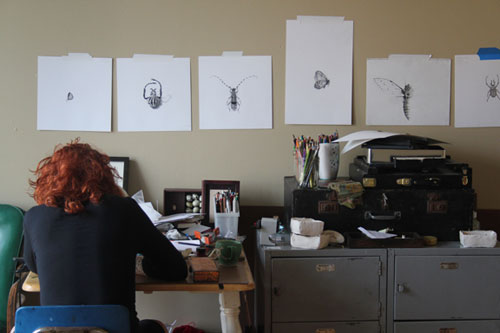
On a sunny afternoon early in September, I drove to the Humboldt Park studio home of Chicago artist Lauren Levato. We drank coffee with chocolate, smoked cigarettes on her back patio, and spoke at length about her work. I first became acquainted with Levato through our mutual friend, Chicago artist and provocateur Tony Fitzpatrick, for whom she works as a Girl Friday. Diligent, focused and at times hard-boiled, Levato has been a fixture of Fitzpatrick projects ranging from stage plays to trade booths at art fairs, including (full disclosure) the Art Brooklyn fair I organized this past March. After trading emails and Facebook messages about writing and art, it became clear there was a story to tell, and so we took Briefing Room along to get it all on tape. (scroll down to end for image credits)
Let's talk about the ideas behind your work, and some of your history. I know you do a lot of writing too, and I wanted to discuss that and how you got into the visual work you're doing through that. The historical development, how it all got started.
I started working at Woman Made gallery when I was in undergrad at Purdue and I would work there as I could doing art handling and PR. I was pursuing a writing degree, and was working for local papers as a stringer immediately out of high school in '96 and was a reporter and editor until 2006. I'd always been interested in visual art, and Woman Made just made sense because I was also getting a degree in Women's Studies. So, I am just one of those people who does a lot of different things at once, holding down three jobs or whatever. I'm from Hobart, Indiana and the state has a great program, being the daughter of a disabled vet, they paid 75% of my tuition if I stayed in-state, so that's how I ended up at Purdue. They had a professional writing program and being a Midwesterner through and through, I was like "How do I do this practically?" meaning, how do I make money?
Any other members of your family involved in any kind of creative work, writers or that kind of thing? How did you get interested if it wasn't in your background?
No. I don't know, I just always was. One of the first things that I ever drew was a newspaper: the masthead, the lead photo above the fold, the whole thing, of a family being attacked by dust bunnies. Then wrote the story out. So I guess I was doing both from the start. I grew up in a very abusive home, so art was a retreat. I was always encouraged. In fact, my family loved the idea that I would be a writer. They were terrified of the fact that I would write a tell-all book. My grandfather was a World War II vet, he encouraged it a lot and I think part of it was personal for him. He wanted to make sure his story was told I guess and then they never once discouraged it, but my family also never forced us to do things we didn't want to do. If I didn't want to do sports, that's not the kind of family I had. Maybe it was because my father was forced into religion by my zealot grandmother but he never ever forced us, and never allowed my mother...my grandmother spoke in tongues, but she was just nuts! Indiana via Tennessee, Mountain Empire people. My father was an altar boy, which is really funny. I talk about the devil and Satan a lot, because my grandmother believed her first children were killed by the devil. She was 16, and poor nutrition and everything else. Her first one was stillborn. Even though she was a six-foot-tall, auburn-haired, you know, frying pan wielding lady, he was forced into religious belief, and she tried to do that with me when I was about five and I was just like, "Well, this is nonsense." I was a very willful child.
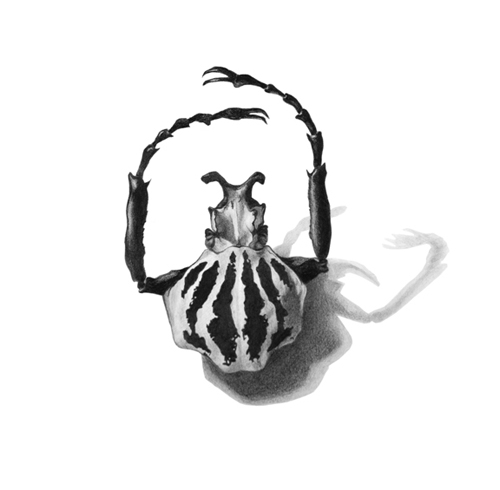
Why did you think that? I wonder why you were resistant to religious beliefs.
Actually, I'm obsessed with it. I almost went to divinity school. Because, I think, it's the last remaining mythos that we have. I studied in college, I studied the bible as literature to try and figure out what was going on there in terms of the narrative and why it was so important to people. How we lost our gods and went from a multi-god thing to how Jesus is in your living room and everyone can have this personal experience of deity. And I was interested in how it has impacted art, and art history, how art is made and how people can relate to art and the destruction that happened there, because there was a sort of divine place for the artist.
When artists were making depictions of religious passages for the illiterate, that sort of thing.
Right, but even before then, going back to Antiquity, which I guess maybe is social media today. It just occurred to me: I grew up in a very strict home, corporal punishment strict, and I know a lot of that comes out of my father's upbringing, in a very religious corporal punishment home himself, and he just struck the religious part but there were still a lot of rules. So, in my adult life, much like in good, Classical art, you have to balance the Dionysian with the Bacchanalian. For me, and my work, as these two concepts sit across from each other opposed, the picture plane is completely full and overflowing and there's tons of information and lots of stuff going on here and then you have an insect drawing that is so crisp, precise and clear and these are things I've been fighting with my entire life.
You're talking about the available range of your creative interests?
Right. So, anyway, getting back to this question of how I started making art, I guess I navigate and negotiate how I can become extremely, extraordinarily hard on myself and internally, I'm talking to myself in this drill sergeant manner and shutting myself down in this very violent way. We're talking about personal demons now--
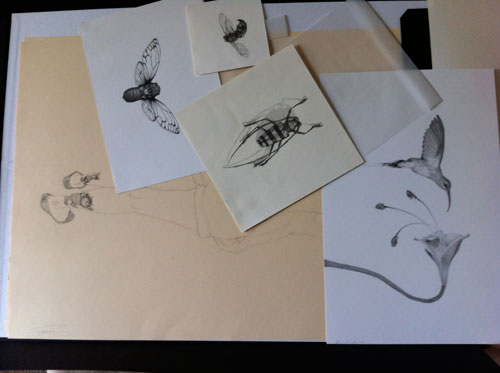
Repression? Resistance to authority?
Exactly. And then there's the part of me that's still that willful child that reacts and rebels against that, and I do that all the time. It's one of the reasons I have to work for myself, I can not have a boss. Then, when my dad died, in the two months after he died, I literally took the chess table and threw it over in the middle of the game. Left my marriage, left everything. Everything for me was 100% completely, radically different after he died and I've learned so much in this year. Its been fantastic, and terrible, traumatic, and awful. But the thing I will put out on the record, which is not something people talk about: when you lose a parent, and young, people who haven't lost a parent, they don't get it. They don't understand, the level of that kind of grief is just...I don't know, I can't make an analogy. But somebody said, about my dad, that he cast a long shadow, which is true. We were at odds for years, but when he died, we were good friends, and we just got closer and closer the older we both got. He realized some of the asshole things he had done to me and apologized to me, which a lot of people never get, an apology, for the sort of brutality that was doled out. Much of it he didn't remember, because he drank a lot and there were a lot of other things going on, but he knew he was a real dick, so he apologized. Years ago. So when he died we were genuinely friends, so the last thing he said to me and the last thing I said to him was "I love you." This was before he couldn't speak anymore, and he was dead a few days later. What people don't talk about is how deep the grief can go and what sort of madness it really is and how liberating it is. It sounds horrible to say that my father dying was extremely liberating but it has been, and it's because all of a sudden the concept you had of the most profound person in your life, what you had of yourself, of men, of what it's like to be married, what it might be like to have children, all this stuff, it changes. 100%. It's all changed and changing, and art is the same thing. Whereas before, the interdisciplinarian, the sort of drill sergeant parent inside of me, would be afraid to make an incorrect mark; which is why I went to a school that was a horrible emotional experience to go to for me: SORA, the School of Representational Art. It's downtown. How I ended up there was, I was in Myopic Books, there was this book on a shelf that almost hit me on top of the head, it was vibrating on the shelf at me. I was at a point where I was trying to decide what to do next with my work. I'd made a bunch of assemblage stuff and I was using insects to make objects and I was getting tired of it. I was constantly frustrated with a lack of realism in my own work. I saw Gail Potocki's book and she lived here in Chicago awhile, bought it, flipped through the back and lo and behold she'd gone to school here in Chicago. Holy shit! Called the director of the school that night, had an interview the next week and started a month later. I knew that was the type of program I wanted to enter, I did not want to go to the traditional type of graduate school because I didn't want to come out in the hole and I didn't want to deal with the shit that people deal with in a graduate program. I'd been working in the art world for so long, I wanted a high level of skill and I didn't buy into this whole idea of "no skill before need." That's just my own personal modality. I want to know how to do it and how to do it perfectly before I start. I try to work backward from my death. When I lecture to students, it's the first thing I tell them. Write your own obituary. It's the first thing I did in journalism school. Is it interesting? Did you want to read it? That's the way I make decisions. Even if people don't like my work, if they can say it's well done, that's okay, that's fine.
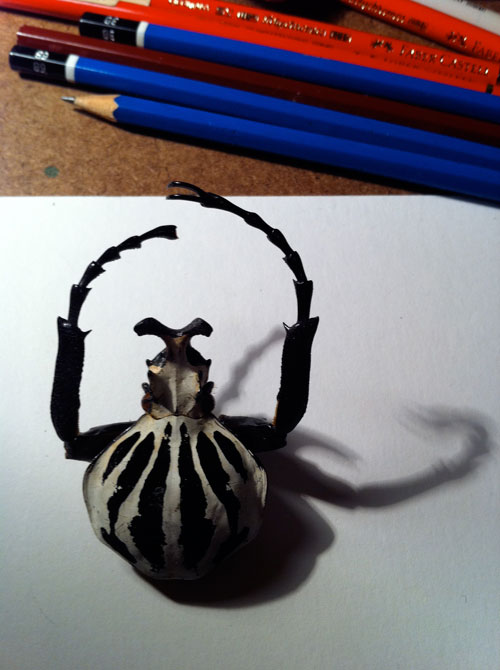
Yeah. From the conversations that we've had, your family life and the dynamic of it really do seem to inform the artistic concepts you're grappling with and formulating.
Yeah, they inform everything and the piece that I'm going to send you, I look physically different. You can look at pictures of me and tell that the look in my eyes is different. Friends have even told me that, that I look radically different. All these tattoos and piercings, I always said that I was scared of very little because my art was my dad. If I can live through him I can live through anything. Well, there's an addendum to that. If I can survive his death, I can survive anything. I don't worry about a lot of shit now. I just don't. In one way, I know there's this sort of mischievous look of childhood freedom. I see my niece get it when she's about to do something she shouldn't do, but then there's also just this incorrigibility. Before I was concerned with this career stuff, all this office stuff. Looking back at myself when I was in my early twenties, I was wearing pantsuits and trying to be professional and more corporate and all this nonsense. And losing him really drove home a lot of things, this dismantling of my life. Again, I've done it several times. How many more times do I want to do it? What's important? You know, the realization hits that you're ultimately alone. Endlessly alone, and as terrifying as that sounds to people, and to me too, there's so much fucking freedom in that.
Isolated, alone, or free to make your own choices? There's a lot of potential meanings, there's a range to that.
All of those things, but specifically what I mean is, well, back to the deathbed thing. When you die, you die alone. I guess I have to connect this to my relationship with men, because of my relationship with my father. I went straight from my dad's home to living in my first husband's home, even though it was ours together, still. Then into another husband's home. So. And that's all I have to say to women who are like "You guys got divorced?" I've never lived on my own until now. Even in college, I still had roommates. Roommates or husbands. One of the things I did first off was go out and get this giant tattoo. When you're married, there's automatically some sort of input somebody has: "What do you think of this haircut?" I have no opinion on that. I'm not trying to seem elusive, but "Do you like it?" Don't do this, don't do that. Hands off! So that's what it's been. Personal integrity, the ability to make these decisions, good or bad, totally on my own. My friends say, "Oh, we don't worry about you, you're already on your sixth or seventh life." I have lived a life of a lot of different lives, and I'll probably be most proud of that when it's my time to go. Whatever it is, I need to be happy and if we made our decisions from that place, as morbid as it sounds, we might make decisions more often that at least made us happier in a deeper way, a way that's more present. As a person, I don't buy into this idea that you have to have a house or a car or kids or any of that stuff to be happy. You don't know where you're going to be in a few years, you could be limbless and in a fucking looney bin in a few years, you don't know. Again, it's this balance between structure and this sort of delineated thing.
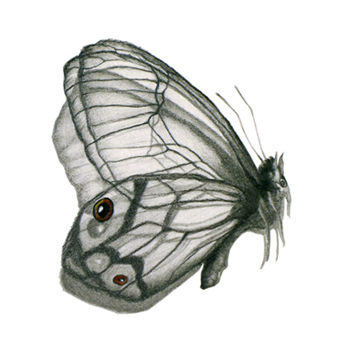
Yes, so let's talk about the structure, all of this has come out of the studies you're doing, this preoccupation with insects. Is this something that came out of your training? How did you come to that...?
Right. Well, in school we'd spend like 190 hours on a single figure drawing, and they're just traditional drawings, and studies, it's just figuration, that's all it is. Putting the figure in space and figuring out how to accurately render form and shapes and values, right? And when you have somebody behind you correcting those things, and being in such a technical mindset for so long, when I got out, it was...I think when anybody leaves school it's a little shock, and with me it was definitely a shock and in my mind I wanted to be making these giant psycho-mythology pieces. It was why I went to the school, but how do you get from A to B? Right? So I just started doing these insect drawings because my studio's full of them, my freezer's full of them. I've always loved them. I almost left the writing program to study etymology, because Purdue's a big etymology school, but I didn't, I ultimately stayed with the course I was on and I'm glad I did. I've always had a lifelong obsession with insects and it got to this sort of fever-pitch in the last few years. Even with the insects, there's a lot of the mythology, like with the cicada. It's one of my favorites. The myth of the creation of the cicada is that Eos, the goddess of dawn falls in love with a mortal man. Right, it's always love, it's always a mortal. And she bestowed upon him eternal life, but forgot to give him eternal youth and so as he aged, he shrank smaller and smaller and smaller. And the sound the cicada makes is him singing his love for her. Forever. I love the mythologies, I love that people are terrified of them...bugs in general. If people are scared of something I immediately want to go find out why. I hear women say, "Well, I can't draw." And I'm like, "Fuck that, I'm going to go draw!" So, everything is a challenge to me, pretty much, and as soon as it's delivered to me as a challenge or a dare, I'm like, "Oh!" That's why I quit drugs.
![photo[1]_sized.jpg](http://gapersblock.com/ac/photo%5B1%5D_sized.jpg)
What kind of drugs were you using?
Everything I could get my hands on. I mean, that's how I dealt with growing up in that house. It was Indiana, I used to sell drugs out of the Arby's drive-thru window when I was fifteen. That was my second job. I did a lot of psychotics, smoked a pound of weed a week, and drank a lot. Just everything. Everything. If you could smoke it, I smoked it. It was getting bad, nineteen of my friends had died. It was time to quit. I could look around the classroom and it was like Heathers, there were missing chairs all of a sudden. Anyway, so I was always obsessed with insects and so they were there and I just started drawing them. I was obsessed with their forms, like with the Longhorns I'm drawing, his antennas, they look like metacarpals in a human hand, so there's this technical challenge of drawing something that's purely black and still making it look dimensional. And then Tony [Fitzpatrick], he saw them, and said "Do a show of your insects at Firecat." So that's what I focused on, but then as I was finishing up that show, things started to change and I don't know if you saw the postcard piece from "The Bodies of Dead Horses," which sold to a really good home, that one was about my dad. So as the grief started to come out more in the work and less in my life, less acting out and more channeling it into the work, the real contained, controlled part of this started to shift and then I started to bring in the mythology. So, that piece was a very highly rendered human heart.
What do you think changed for you there, I mean, what was that shift? What caused that for you?
I was working on it...I wanted to do a heart piece for the show because I wanted to have one other thing in there besides the insects. But I was running out of time to do that, so I decided I'd make one or two that weren't just insects, and [my friend] Chris came over and saw what I was working on, again a very contained, controlled composition, and he actually said, "What if you just made it like an explosion or a giant bloom of insects?" And he's very into symmetry, so he's thinking of it like an atomic cloud of insects, right? Coming out of the heart? So I changed it to be more like with banners blowing in the wind, where it just moves off in one direction. I like to say that one of the jobs of being friends with other artists is to give your friends permission slips. I mean, I think that's why we have friends, and they're not actual permission slips, but you know what you want to do, but it just takes one person to say "Just do it." Those people are really important in your life, and I trust Chris, his aesthetics, probably more than anybody's of my circle of friends and art-makers and when he said it, I was like, "Yeah, you're right." I also got pissed at him, I was like, "Fuck you! Come in here and say anything to me." But then I was like "Shit, you're right." So, that was it. Then, when I started talking about goats...he's also obsessed with death culture. Well, he's more obsessed with it than I am, I just have a passing interest in it because of my father.
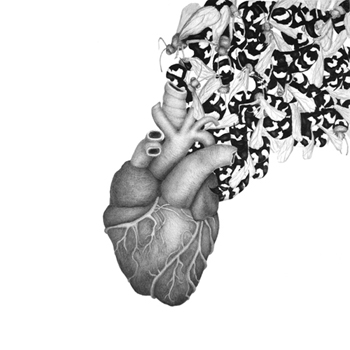
But he has like curio cabinets full of human hair? That kind of thing?
Absolutely, oh my gosh. And all these photos of like funeral arrangements and all that sort of thing, so I started looking at them and thinking about this goat motif. It's changed a lot since its original incarnation, there was just a lot to tell.
Why was it called "From The Bodies of Dead Horses?" Is the heart an image of a horse's heart?
No, it's a human heart. But, "From The Bodies of Dead Horses" because people believed that wasps sprung from the bodies of dead horses because somebody probably saw a wasp coming out of a horse carcass, and they are carrion insects and they would have swarmed and devoured the body and somebody would have seen that and assumed that's where wasps come from. There's also a myth that they come from and, all that sort of stuff. So, before there was scientific study of insects, there was all this myth about where they come from.
It's interesting, coming from Indiana, people have these solutions to the problems of their day to day experiences that are just wildly inventive.
Yeah, like using cobwebs to heal a wound. Have you ever heard of people stuffing a wound with cobwebs? They still do that in Indiana. It's like in My Big Fat Greek Wedding, Windex solves everything.

Yeah. Well, some of it is driven by poverty, right? There's just not the kind of access to science of the grade that actually could help with somebody's ailments or problems, it's these differences between living in a city and living in a rural environment that's partly motivated by a need to accept you can't have all the systems that humans are capable of bringing, because the environment isn't capable of sustaining it. It's interesting that people come to live here in this city from the surrounding rural environments and they bring all this struggle and background that is almost anti-Modernist in a way. I was having a conversation with a friend of mine recently about what the true definition of a hipster is, and it's that you've come from a background where the environment is politically and culturally conservative and you get hip to the idea that it's something you can abandon, so you move to a city and have struggled against this repressive environment and decided that there's a way out that you make for yourself. I think a lot of upper class people like to imitate that struggle in superficial ways, through things like fashion, but there's this break that happens and when you experience that break, from abandoning your historical, familial context, it's like discovering a new world. So that's what I like about Chicago in a way, there's a layer in the culture of this transitional awakening that people go through. I recognize this from the story you're telling, it goes beyond that, it's almost like magical thinking, and then the challenge is to take that and objectify it in this artistic process, that's really fascinating to me. If you think of art as a product of your experience.
Yeah, I'm working on this Medusa piece. It's a piece I've been talking about slash threatening to do for years. I'm going to say this and I don't mean it in some sort of...ah, I'll just go ahead and say it: my friend Simone Muench, she has a Medusa poem that she'd written, and she says that every woman has a Medusa poem. And it's true.
What does the Medusa figure represent for you?
Lots of things. Well, it's purely sex now, that's what we're talking about. And by the time you get to your mid-thirties, you've gone through some shit. You've had your encounter with the world. And sometimes those encounters, they're awful. So I had one of those "Had I known then what I know now sort of things." But, owning the Medusa, it can mean a lot of things but what it means to me and what I'm doing is when you finally step into your own shoes or your own snakes, you have to earn that ability to have those snakes on your head and you need them. Everybody needs them, not just women. It's not just a fight against men or anything, which is a one-dimensional way to look at it, there's a man, or series of men, coming for your head. Let's put that aside. These snakes represent your ability to strike back at anything that's coming up against you. There are other things there too, Medusa had two other sisters who you never really hear about, but she's a gorgon, there's a whole civilization. You don't hear a lot about it, it's just this one woman and there's always these sort of epic stories where one thing has to overcome another thing and for me, there's always that struggle. So this trope even now, there's a lot of breaking of taboos in it, there's eye contact but not just that, it's an invitation to fight, but I don't think that's for the viewer, it's more like looking in the mirror. It's what any self-portrait is, so to do a self-portrait as Medusa, there's a claiming and owning of your own power and your own strength, and I think I've learned what that is and what that isn't in the past year, and taken it to a whole new level.

This seems like the formulation of an artistic concept, this depiction of strength. This question of reflection and the challenge of the gaze in particular, as a kind of self-confrontation. I'm very interested in the ideas people have about their own work. How would you articulate that?
That's a good question. It's a tough question. I don't think I've ever been asked a question I can't answer. Because I'm trying to put all the pieces together, and trying to sum it up in an elevator speech which I'm usually really good at. There's a lot of snake movement.
That's part of the discovery of it. There's this interesting dynamic here in the animism that runs throughout the work, and this look at the repression of consciousness. I mean, what is the animistic nature of the work, I guess? Whether it's insectoid or mytho-symbolic, psychological.
It's definitely all of those things. When I was a little girl, I had this dog Patches who I would always cry to after I'd endured some sort of beating, verbal or physical from my dad or some sort of flying off the handle sort of thing that you just can't handle when you're five. So, I've always identified with animals much more than people, and that seems to be a common thing with women. There was just recently a study about the mental state of women who identify with horses, and little girls' thing with horses, there's the fairy thing which a lot of people like to paint me as like Tori Amos out in the forest, because I have red hair and like things with wings. But there's a reason for that, it's the Daphne story, it's the escapism, so I'm not going to turn myself into a stock in trade. I've done that shit and I'm not doing it anymore. That's what this is about.
You've mentioned it in terms of contending with sexuality and in terms of people acting themselves, and not being put in a position where you're mothering them, which is interesting to me when you talk about marriages, because it seems to me people reach a stage where they agree there's a self-realization, and they agree they can be good for each other and learn from each other. I think a lot of relationships work because there's a lot people can learn from each other, and I wonder if that's not a part of this experience you're depicting.
Right. The Medusa is a sort of power statement. We all have that thing inside of us that's trying to cut off our head. This gets back to the permission slip idea. You know what you want to do. But you give so many reasons why you shouldn't do it. People do this their whole lives, and it can be whatever it is: self-doubt, addiction, any kind of self-abuse which, by the way, isn't always a bad thing. I think you can learn a lot about yourself by going deep into that problem.
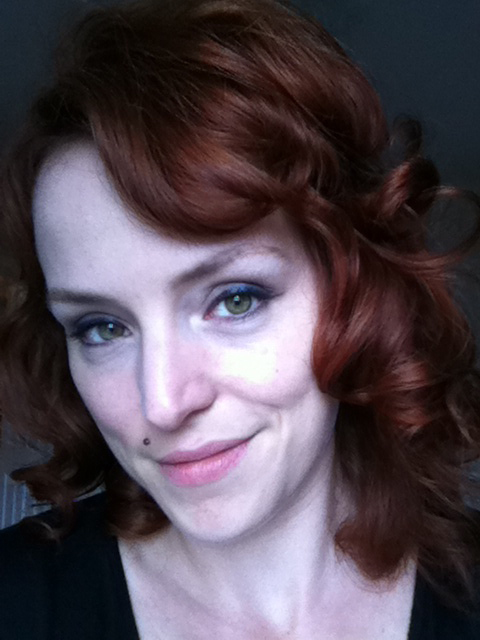
Right, society doesn't make room for the irrational anymore. It has hardened into convention.
In Gnostic texts, there's a lot of discussion about this as marrying the two sides of self. You brought up this idea of marriage, again, with this concept of duality: we have this idea that's awful and horrible that you have to find this other person that completes you, and this gets back to the idea of being alone. You are really ultimately alone. Because you know, when that person dies, or becomes a cocaine addict or whatever, you still have to go on. So, how do you contain yourself, hold yourself, and keep yourself in the face of so many other relationships that place so many demands on you? The hardest one is marriage. I say alone, meaning un-partnered. At any moment you can be alone, un-partnered, un-mothered, un-anything. These things that make up the web of self, they all can be undone. I have undone many of them myself, cut ties. And there's been a certain amount of safety in there for me personally to always be the one with the escape hatch. I've always been the one to leave. So, when my dad died, that was the first time I'd been left, and I was like, "What the fuck do I do now?" So to navigate that, there's always these things to balance.
Yeah. I always think about it as you can be alone reluctantly, or you can be alone productively.
Right. And I try my damnedest to be alone productively.
Image credits and captions (in order of appearance): All images courtesy Lauren Levato unless otherwise noted. All works are Graphite on Bristol Board unless otherwise noted.
Levato at work in her studio.
Lauren Levato, "Decapitated Stag," 2011.
A selection of Levato's insect drawings.
The Goliath beetle that was the model for "Decapitated Stag."
Lauren Levato, "Glasswing," 2011. Graphite and colored pencil.
An insect anatomy chart from Levato's studio.
Lauren Levato, "From the Bodies of Dead Horses," 2011.
Pencils and insect models on a counter in Levato's studio.
Levato drawing in the studio.
Levato portrait shot at Firecat.









Karen Mathews Beard / September 25, 2011 5:00 PM
Lauren,I could not stop reading you're message. Everything you said I have just found out happened too Stephanie & Candace by Steve.You're work is so wonderful and you are such a strong woman. I hope one day we can talk. You are BEAUTIFUL. Much Love Karen